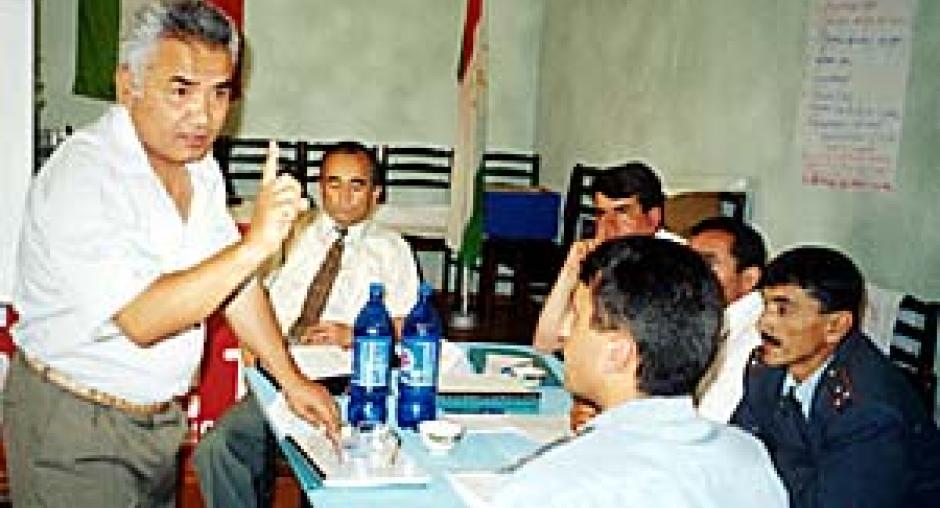Newsroom
OSCE Centre holds Dushanbe conference on preventing use of violence during investigation and pre-trial detention
DUSHANBE 5 December 2003

The OSCE Centre in Dushanbe also helped to raise human rights awareness through training seminars held last year (July 2002) (Oksana Vulpe/OSCE) Photo details
DUSHANBE, 5 December 2003 - A two-day national conference in Tajikistan on preventing the use of violence during investigation and pre-trial detention, organized by the OSCE Centre in Dushanbe, has just concluded with a set of recommendations and proposals for a working group to develop a new national strategy.
The event which took place in the capital Dushanbe, included representatives of governmental institutions and law enforcement bodies, domestic non-governmental organizations (NGOs), international organizations, as well as lawyers and journalists.
In his opening speech, the Head of the OSCE Centre, Ambassador Yves Bargain, said, "The problem of use of different forms of violence, torture and other cruel, inhuman and degrading treatment or punishment during different periods of detention as well as investigation is extremely serious, both from the point of view of human rights and that of providing just and fair trial."
Experts from the Warsaw-based Office for Democratic Institutions and Human Rights (ODIHR), the Association for the Prevention of Torture and the Russian-based Committee of Defence of Civil Rights also attended the conference, which was opened by the Ambassador Bargain and the General Prosecutor of Tajikistan, Bobojon Bobokhonov.
During the event, co-organized with the Office of the General Prosecutor of the Republic of Tajikistan, various ways of promoting improvements in Tajikistan's legislation and practices with the aim of preventing the use of violence, torture and other inhuman and degrading treatment by the practice of law-enforcement agencies were actively discussed.
Participants focused on the definition of torture and its consequences, mechanisms to address complaints, the training of law-enforcement agencies, use of evidence obtained by torture, access to a lawyer at the outset of detention, and public control.
Sociological research on torture cases, prepared by an NGO, the League of Women Lawyers, with the support of the OSCE Centre, was presented during the conference and stimulated a lively debate.
The conference also adopted a document that included a set of recommendations and the proposal to set up a working group aimed at developing a national strategy for the prevention of torture. It will be forwarded by the Centre to the relevant authorities in Tajikistan, in order to initiate relevant activities.
The event which took place in the capital Dushanbe, included representatives of governmental institutions and law enforcement bodies, domestic non-governmental organizations (NGOs), international organizations, as well as lawyers and journalists.
In his opening speech, the Head of the OSCE Centre, Ambassador Yves Bargain, said, "The problem of use of different forms of violence, torture and other cruel, inhuman and degrading treatment or punishment during different periods of detention as well as investigation is extremely serious, both from the point of view of human rights and that of providing just and fair trial."
Experts from the Warsaw-based Office for Democratic Institutions and Human Rights (ODIHR), the Association for the Prevention of Torture and the Russian-based Committee of Defence of Civil Rights also attended the conference, which was opened by the Ambassador Bargain and the General Prosecutor of Tajikistan, Bobojon Bobokhonov.
During the event, co-organized with the Office of the General Prosecutor of the Republic of Tajikistan, various ways of promoting improvements in Tajikistan's legislation and practices with the aim of preventing the use of violence, torture and other inhuman and degrading treatment by the practice of law-enforcement agencies were actively discussed.
Participants focused on the definition of torture and its consequences, mechanisms to address complaints, the training of law-enforcement agencies, use of evidence obtained by torture, access to a lawyer at the outset of detention, and public control.
Sociological research on torture cases, prepared by an NGO, the League of Women Lawyers, with the support of the OSCE Centre, was presented during the conference and stimulated a lively debate.
The conference also adopted a document that included a set of recommendations and the proposal to set up a working group aimed at developing a national strategy for the prevention of torture. It will be forwarded by the Centre to the relevant authorities in Tajikistan, in order to initiate relevant activities.
